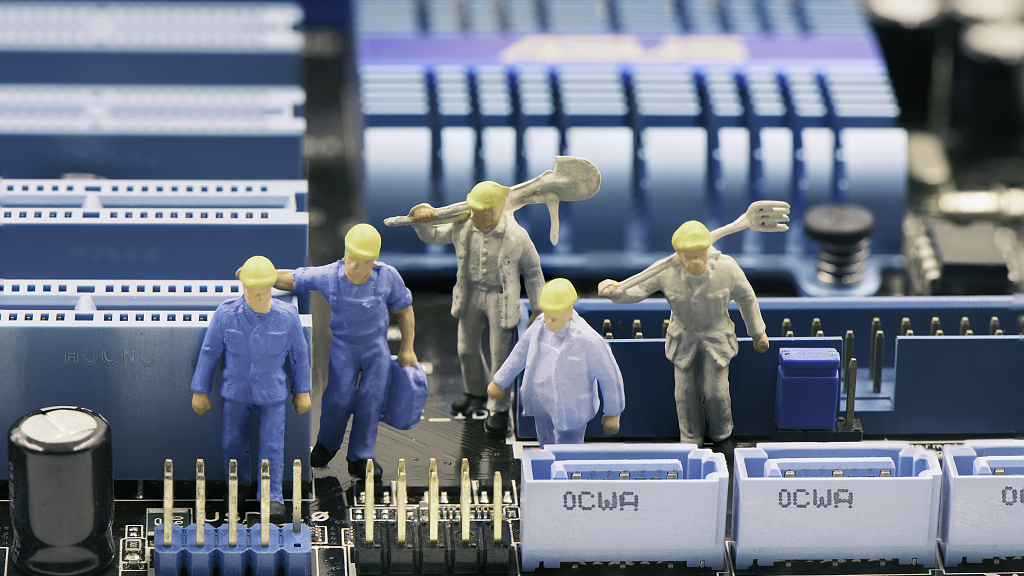Editor's note: Djoomart Otorbaev is the former Prime Minister of the Kyrgyz Republic, a distinguished professor of the Belt and Road School of Beijing Normal University, and a member of Nizami Ganjavi International Center. The article reflects the author's views and not necessarily those of CGTN.
After many years of planning and hard work, China now dominates the global production of the newest batteries, which are crucial to carbon footprint and sustainable development. The main applications for the new batteries are in electric vehicles (EVs) and portable consumer electronics such as cell phones and laptops. For example, battery cells and assemblies account for 35 to 50 percent of the cost of electric vehicles.
According to BloombergNEF intelligence, China's current success is the result of several fundamental factors. China has large domestic battery demands. The country controls 77 percent of the world's battery capacity, 80 percent of raw materials refining, and 60 percent of global component manufacturing. For this parameter in 2020, Japan, South Korea, and the U.S. ranked second, third, and sixth.
Many experts agree that the main reason for the current dominance of China in the production of the latest batteries is the government's policy. It actively spurred the rapid growth of hundreds of local startups by providing them with cheap loans and tax incentives. One of the brightest examples of such companies is the history of the CATL startup. Founded in 2011 as the cell phone battery division of TDK, which has supplied products to Apple and other mobile device manufacturers, it has impressively grown since then.
Critically, CATL used the government-backed Thousand Talents plan to recruit top-notch experts from around the world. Among them was the company's current Chief Technology Officer, Bob Galyen, an internationally renowned American battery technology expert. Engineers also came from such companies Bosch, Continental, and Valeo.
CATL has now become the world's largest manufacturer of batteries for electric vehicles. For the past four years, South Korean market tracker SNE Research has ranked it number 1 in electric vehicle batteries with a market share of 27.9 percent.
A month ago, CATL founder Zeng Yujun told Bloomberg that the company had developed a power system that can run over a million miles. Their main customers include Tesla, Daimler AG, BMW, and Toyota.
The U.S. is especially concerned about lagging behind China in battery production. Simon Moores of Benchmark Mineral Intelligence, speaking before a committee of the U.S. Congress in May of last year, said: 'We are in the midst of a global battery arms race, in which so far the U.S. is a bystander… Yet China has consolidated its power over their production and processing while America lags far behind." At a congressional committee meeting, it was stated that there are 136 large factories to produce batteries for electric vehicles in the world today. Of these, 101 in China and only eight in the U.S. China launches a new gigafactory of batteries every week, the U.S. one in four months.

At the China Auto Chongqing Summit held on June 12 and 13, two leaders of China's largest electric vehicle manufacturers announced that electric cars and plug-in hybrids would dominate the world's largest auto market in about a decade. This category accounted for more than 10 percent of new car sales in China in March and rose to 11.5 percent in May, said Wang Chuanfu, founder of BYD. He predicts that penetration will increase to over 70 percent in 2030. William Lee, founder and CEO of electric car startup Nio was even more optimistic. He predicted that so-called intelligent electric vehicles would account for 90 percent of new car sales in 2030
Crucially, Chinese officials and car company executives call for stable policies in the post-subsidy era to ensure the growth of the intelligent EV sector in the world's largest auto market. China began offering subsidies for new energy vehicles in 2009, but the government is phasing out the incentive and plans to end it altogether starting in 2023.
Fu Bingfeng, executive vice president of the China Association of Automobile Manufacturers, said China's new energy vehicle market would grow 40 percent year on year for at least the next five years. He estimates that such cars will account for 20 percent of new vehicle sales in 2025. That figure was 8.7 percent in the first five months of this year and 5.4 percent last year. Beijing would like to see 20 percent of cars sold on new energy by 2025. According to the McKinsey Electrification Model, it has been estimated that China will remain the leader in electric vehicle sales with 9.0 million units sold in 2030, compared with about 5.5 million in Europe.
The critical point for the future development of vehicles is that they must be environmentally friendly and intelligent. Future cars will become mobile cabins in which passengers can comfortably work or rest. Only those who excel in software, artificial intelligence, and smart manufacturing can become leading players in the future of the automotive industry. The future will be not necessarily car companies but those that can improve the latest vehicles, acting as efficient ecosystems based on innovative low-carbon technologies.
(If you want to contribute and have specific expertise, please contact us at opinions@cgtn.com.)

